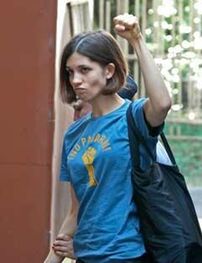Two weeks ago, the production quotas for all prison work shifts were arbitrarily increased by fifty units. If previously the minimum was one hundred uniforms a day, now it is one hundred and fifty. According to the Labor Code, workers must be notified of a change in the production quota no less than two months before it is goes into effect. At IK-14, we just woke up one day to find we had a new quota because the idea happened to have popped into the heads of the wardens of our “sweatshop” (that’s what the prisoners call the penal colony). The number of people in the work shift decreases (they are released or transferred), but the quota grows. As a result, those who remain have to work harder and harder. The mechanics say they don’t have the parts to repair the machinery and will not be getting them. “There are no spare parts! When will they come? What, you don’t live in Russia? How can you ask such questions?” During my first few months in the manufacturing zone, I nearly mastered the profession of mechanic, out of necessity and on my own. I would attack my machine, screwdriver in hand, desperate to fix it. Your hands are scratched and poked by needles, your blood is all over the table, but you keep on sewing. You are part of an assembly line, and you have to do your job alongside the experienced seamstresses. Meanwhile, the damned machine keeps breaking down. Because you’re the newcomer and there is a lack of good equipment in the prison, you end up with the worst equipment, the most worthless machine on the line. And now it’s broken down again, and once again you run off looking for the mechanic, who is impossible to find. You are yelled at and berated for slowing down production. There are no sewing classes at the prison, either. Newcomers are immediately plunked down in front of their machines and given their assignments.
“If you weren’t Tolokonnikova, you would have had the shit kicked out of you a long time ago,” say fellow prisoners with close ties to the wardens. It’s true: other prisoners are beaten up. For not being able to keep up. They hit them in the kidneys, in the face. Convicts themselves deliver these beatings and not a single one of them happens without the approval and knowledge of the wardens. A year ago, before I came here, a gypsy woman was beaten to death in the third unit. (The third unit is the “pressure cooker”: prisoners whom the wardens want subjected to daily beatings are sent there.) She died in the infirmary at IK-14. The administration was able to cover up the fact she had been beaten to death: a stroke was listed as the official cause of death. In another block, new seamstresses who couldn’t keep up were undressed and forced to sew naked. No one dares complain to the wardens, because all they will do is smile and send the prisoner back to the dorm unit, where the “snitch” will be beaten on the orders of those same wardens. For the prison warden, managed hazing is a convenient method for forcing convicts to totally obey their lawless regime.
A threatening, anxious atmosphere pervades the manufacturing zone. Eternally sleep-deprived, overwhelmed by the endless race to fulfill inhumanly large quotas, the convicts are always on the verge of breaking down, screaming at each other, fighting over the smallest things. Just recently, a young woman got stabbed in the head with a pair of scissors because she didn’t turn in a pair of pants on time. Another tried to cut her own stomach open with a hacksaw. She was stopped from finishing the job.
Those who found themselves at IK-14 in 2010, the year of smoke and wildfires [21] Throughout Russia, because of anomolously high temperatures.
said that when the fire would approach the prison walls, convicts continued to go to the manufacturing zone and fulfill their quotas. Because of the smoke you couldn’t see a person standing two meters in front of you, but, covering their faces in wet kerchiefs, they all went to work anyway. Because of the emergency conditions, prisoners weren’t taken to the cafeteria for meals. Several women told me they were so horribly hungry they started keep diaries to document the horror of what was happening to them. When the fires were finally put out, prison security diligently rooted out these diaries during searches so that nothing would be leaked to the outside world.
Sanitary conditions at the prison are calculated to make the prisoner feel like a disempowered, filthy animal. Although there are hygiene rooms in the dorm units, a “common hygiene room” has been set up for corrective and punitive purposes. This room can accommodate five people, but all eight hundred prisoners are sent there to wash up. We must not wash ourselves in the hygiene rooms in our barracks: that would be too easy. There is always a stampede in the “common hygiene room” as women with little tubs try to wash their “breadwinners” (as they are called in Mordovia) as fast as they can, clambering on top of each other. We are allowed to wash our hair once a week. However, even this bathing day gets cancelled. A pump will break or the plumbing will be stopped up. At times, my dorm unit has been unable to bathe for two or three weeks.
When the pipes are clogged, urine gushes out of the hygiene rooms and clumps of feces go flying. We’ve learned to unclog the pipes ourselves, but it doesn’t last long: they soon get stopped up again. The prison does not have a plumber’s snake for cleaning out the pipes. We get to do laundry once a week. The laundry is a small room with three faucets from which a thin trickle of cold water flows.
Convicts are always given stale bread, generously watered-down milk, exceptionally rancid millet, and only rotten potatoes for the same corrective ends, apparently. This summer, sacks of slimy black potato bulbs were brought to the prison in bulk. And they were fed to us.
One could endlessly discuss workplace and living conditions violations at IK-14. However, my main grievance has to do with something else. It is that the prison administration prevents in the harshest possible way all complaints and petitions regarding conditions at IK-14 from leaving the prison. The wardens force people to remain silent, stooping to the lowest and cruelest methods to this end. All the other problems stem from this one: the increased work quotas, the sixteen-hour workday, and so on. The wardens feel they have impunity, and they boldly crack down on prisoners more and more. I couldn’t understand why everyone kept silent until I found myself facing the mountain of obstacles that crashes down on the convict who decides to speak out. Complaints simply do not leave the prison. The only chance is to complain through a lawyer or relatives. The administration, petty and vengeful, will meanwhile use all the means at its disposal for pressuring the convict so she will see that her complaints will not make anything better for anyone, but will only make things worse. Collective punishment is employed: you complain about the lack of hot water, and they turn it off altogether.
In May 2013, my lawyer Dmitry Dinze filed a complaint about the conditions at IK-14 with the prosecutor’s office. The prison’s deputy warden, Lieutenant Colonel Kupriyanov, instantly made conditions at the camp unbearable. There was search after search, a flood of disciplinary reports on all my acquaintances, the seizure of warm clothes, and threats of seizure of warm footwear. At work, they get revenge with complicated sewing assignments, increased quotas, and fabricated defects. The forewoman of the neighboring unit, Lieutenant Colonel Kupriyanov’s right hand, openly incited prisoners to sabotage the items I was responsible for in the manufacturing zone so there would be an excuse to send me to solitary confinement for damaging “public property.” She also ordered the convicts in her unit to provoke a fight with me.
Читать дальше








